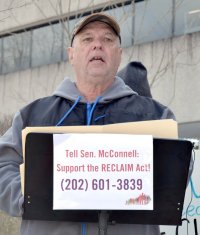Kentucky's retired coal miners also face a looming pension crisis

I am a retired UMWA coal miner from western Kentucky and a KFTC member.
I worked underground for many years and very proud of that work. When I put on my bank clothes to go underground I did so secure in the knowledge that the benefits I was earning would be there for my wife and myself to survive during our retirement years. But now, thousands of retirees like me all across the coalfields will lose their pensions due to the 2008 financial crisis and coal company bankruptcies.
My wife Hattie and I went to Washington, DC to meet with Kentucky's House and Senate members concerning passage of the RECLAIM Act. KFTC also encouraged us to carry a message about our pensions. Here is an update on that effort.
The UMWA 1974 Pension Plan is expected to become insolvent by 2022 according to its own actuaries. A market downturn will hasten that insolvency. Other multi-employer pension plans are approaching insolvency as well; some could run out of money by 2022, Pension funding has taken on an urgent importance. As plans collapse their beneficiaries and dependents will be dropped into the Pension Benefit Guarantee Corporation (PBGC), a multi-employer, private sector funded insurance program for defunct plans, destroying that program.
Multi-employer plans are defined-benefit plans created by collective bargaining agreements between a labor union and two or more employers and typically exist in industries with many small employers, employers that would not ordinarily establish a defined-benefit plan on their own.
There are about 1,400 multi-employer defined benefit pension plans, covering about 10 million working people. Many of these participants are employed by small companies in the building and construction industries. Other industries with significant numbers of workers covered by multi-employer plans are:
- retail trade and service industries
- manufacturing
- mining
- trucking and transportation industries, and
- entertainment (film, television and theater)
The Joint Select Committee on the Solvency of Multi-employer Pension Plans was created as part of the bipartisan budget agreement reached Feb. 7, 2018 by Congress to address the problem. It calls for eight members from the House and eight from the Senate, split evenly between Republicans and Democrats. Members are:
| Republicans | Democrats |
| Sen. Orrin Hatch (R-UT) Co-Chair | Sen. Sherrod Brown (D-OH) Co-Chair |
| Sen. Rob Portman (R-OH) | Sen. Joe Manchin (D-WV) |
| Sen. Lamar Alexander (R-TN) | Sen. Heidi Heitkamp (D-ND) |
| Sen. Mike Crapo (R-ID) | Sen. Tina Smith (D-MN) |
| Rep. Virginia Foxx (R-NC) | Rep. Bobby Scott (D-VA) |
| Rep. Phil Roe (R-TN) | Rep. Richard Neal (D-MA) |
| Rep. Vern Buchanan (R-FL) | Rep. Debbie Dingell (D-MI) |
| Rep. David Schweikert (R-AZ) | Rep. Donald Norcross (D-NJ) |
The committee is tasked with:
- holding its first meeting by March 12.
- reporting a finding to Congress by the last week of November 2018. If there is an agreement to take action, the committee will draft and submit legislative language as part of that report.
- crafting an agreement to move forward which will require at least five Democrats and five Republicans. Any bill they propose cannot be amended or voted down where it will get expedited votes in both chambers. There will be no amendments allowed.
- holding at least 5 meetings, of which at least three must be public hearings. The committee is encouraged to hold at least one field hearing away from Washington, DC.
Pensions and health care, like wages, are earned compensation for work performed. They are important to retirees by allowing them to make ends meet and retire with dignity. They are of great value, injecting money into a local economy, opening up job opportunities for younger workers and insuring parents do not become a burden on their children, many of whom struggle in an already distressed economy. Consequently, earned pensions should not be hampered by plant closures or legacy divesting bankruptcies.
This legislation will hopefully maintain the viability of pensions that retirees worked their entire adult life to receive. This is a moral issue. It is about ensuring that the benefits union members earned and need to survive are there for their lifetimes.
I am encouraged that the Joint Select Committee on the Solvency of Multi-employer Pension Plans was created by Congress in part because of the efforts of advocacy groups like KFTC and the UMWA. I am guardedly optimistic that this is a genuine effort to enact real pension reform. The committee's proceedings will be monitored very closely and should this be anything other than a favorable pension fix I will once again be crusading for that cause.
Recent News
Kentucky’s past legislative session showed alarming trend toward government secrecy
Churchill Downs takes more than it gives. That's why the Kentucky Derby is a no-go for me
‘We must never forget.’ Kentucky town installs markers for lynching victims.
Featured Posts
Protecting the Earth
TJC Rolling Out The Vote Tour – a KFTC Reflection Essay
KFTC Voter Empowerment Contractor Reflection Essay
Archives
- Home
- |
- Sitemap
- |
- Get Involved
- |
- Privacy Policy
- |
- Press
- |
- About
- |
- Bill Tracker
- |
- Contact
- |
- Links
- |
- RSS

